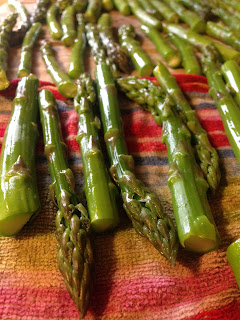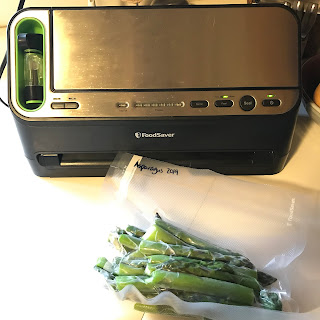This is one, of many, items that we do not buy out of season, so freezing what we can is a priority. Freezing what we don't devour fresh that is!
Asparagus can also be pickled, but my personal favorite way to preserve it is by freezing. The most difficult thing about freezing it is making sure it doesn't get lost at the bottom of the freezer!
Equipment Needed:
Asparagus, knife, towels, pot for blanching, cookie sheets, vacuum sealer & bags/freezer baggies.
Freezing Asparagus
From there you can put your asparagus directly into your freezer containers for storage OR you can lay out on cookies sheets and freezer spears before final storage. This is my preferred method.
After the spears are frozen I prefer to transfer to vacuum sealed bags with 1-2 meals worth in each bag. When the spears are frozen ahead it is much easier to just remove what you want, instead of dealing with a frozen blob.
Make bags a little larger than needed, so they can be washed and reused, reducing waster. Don't forget to write the date on the bag!! Since I just do asparagus once per year, I just write the year for this crop. Use within 6 months to a year. (Literally they will be fine longer, but they may not have as much nutrition.)
You can also just pack into freezer baggies, or jars, but they will have a shelf life of more like 3-6 months, since the air is not removed.
I highly recommend a vacuum sealer! It's a great investment.





No comments:
Post a Comment